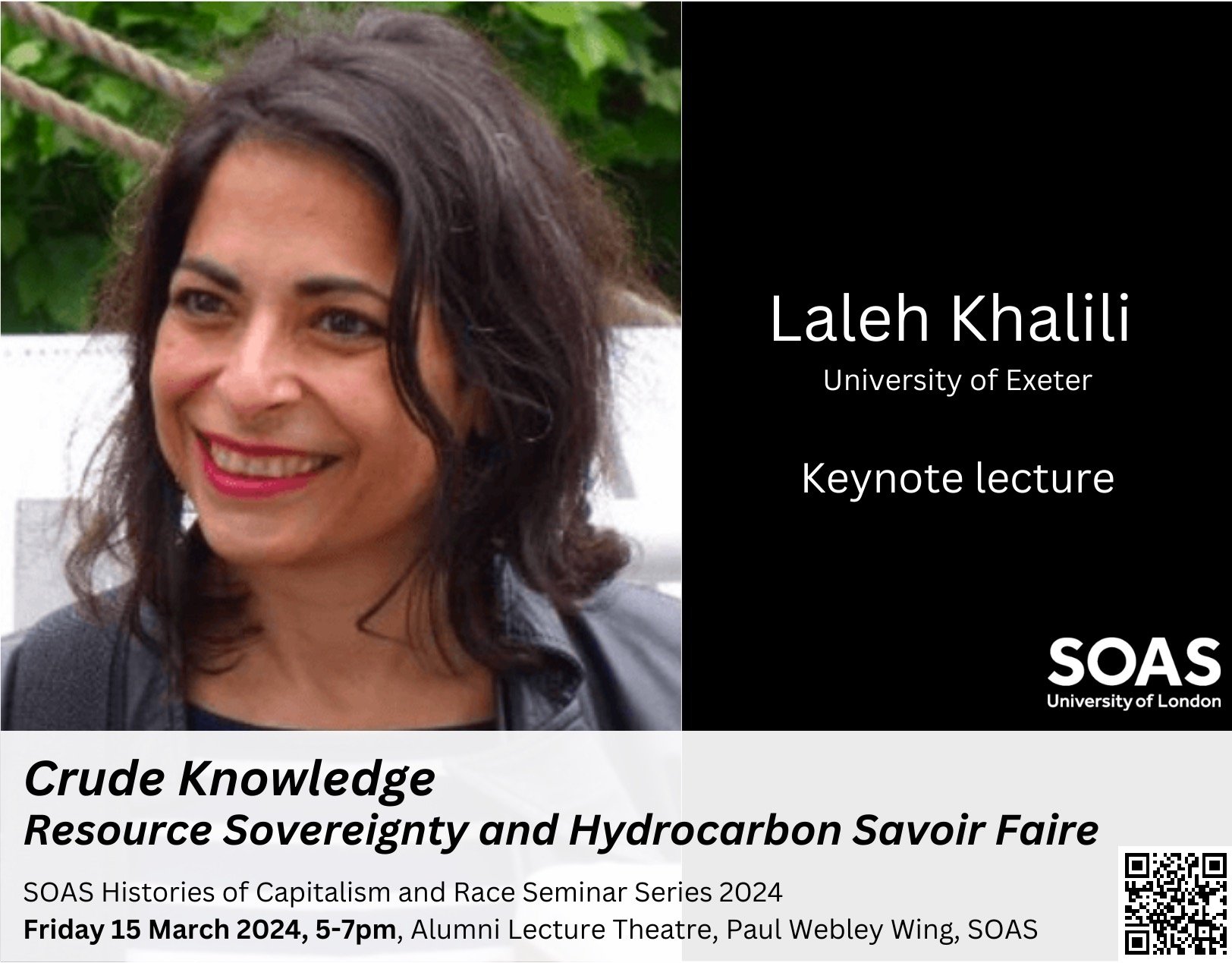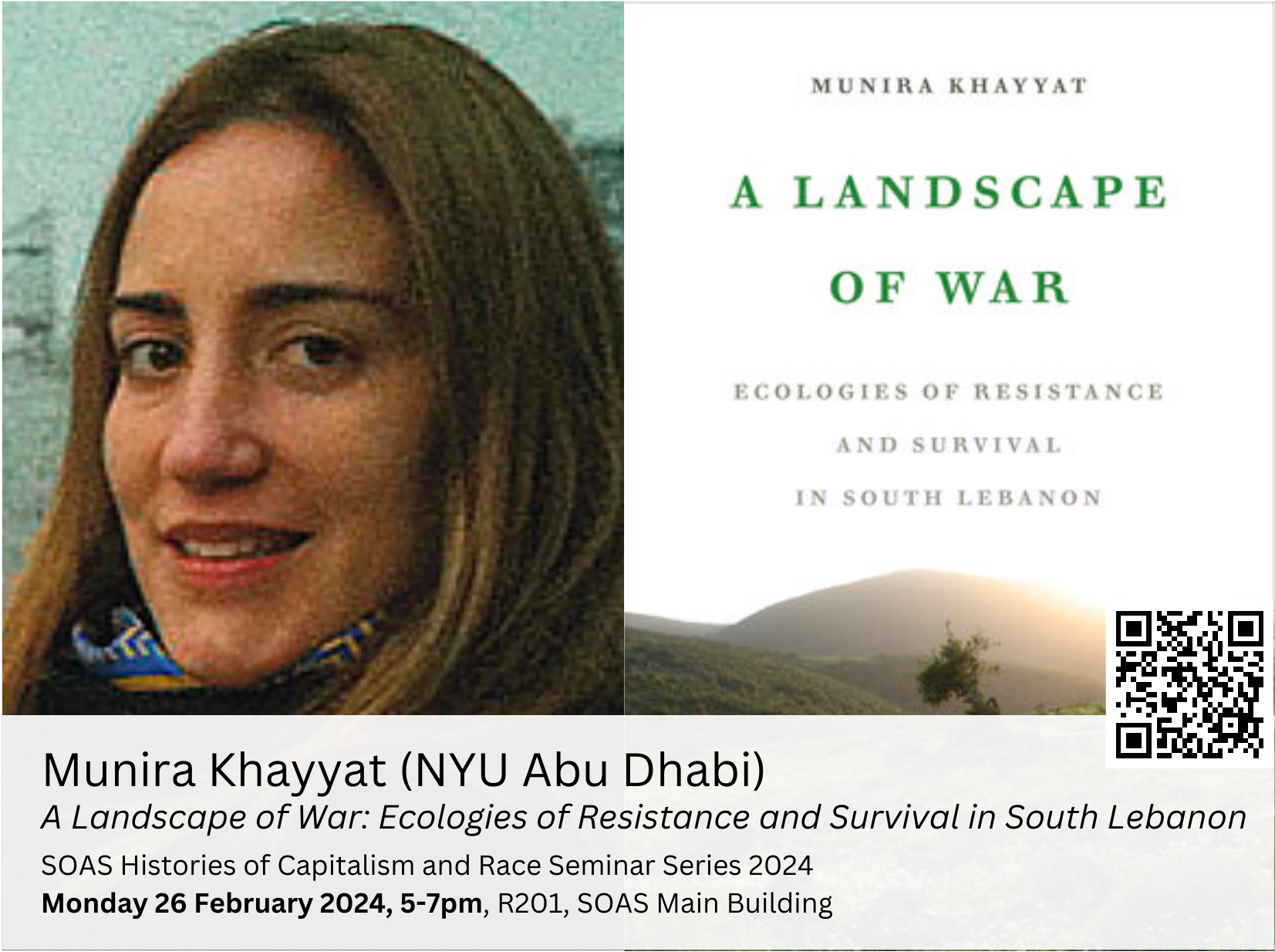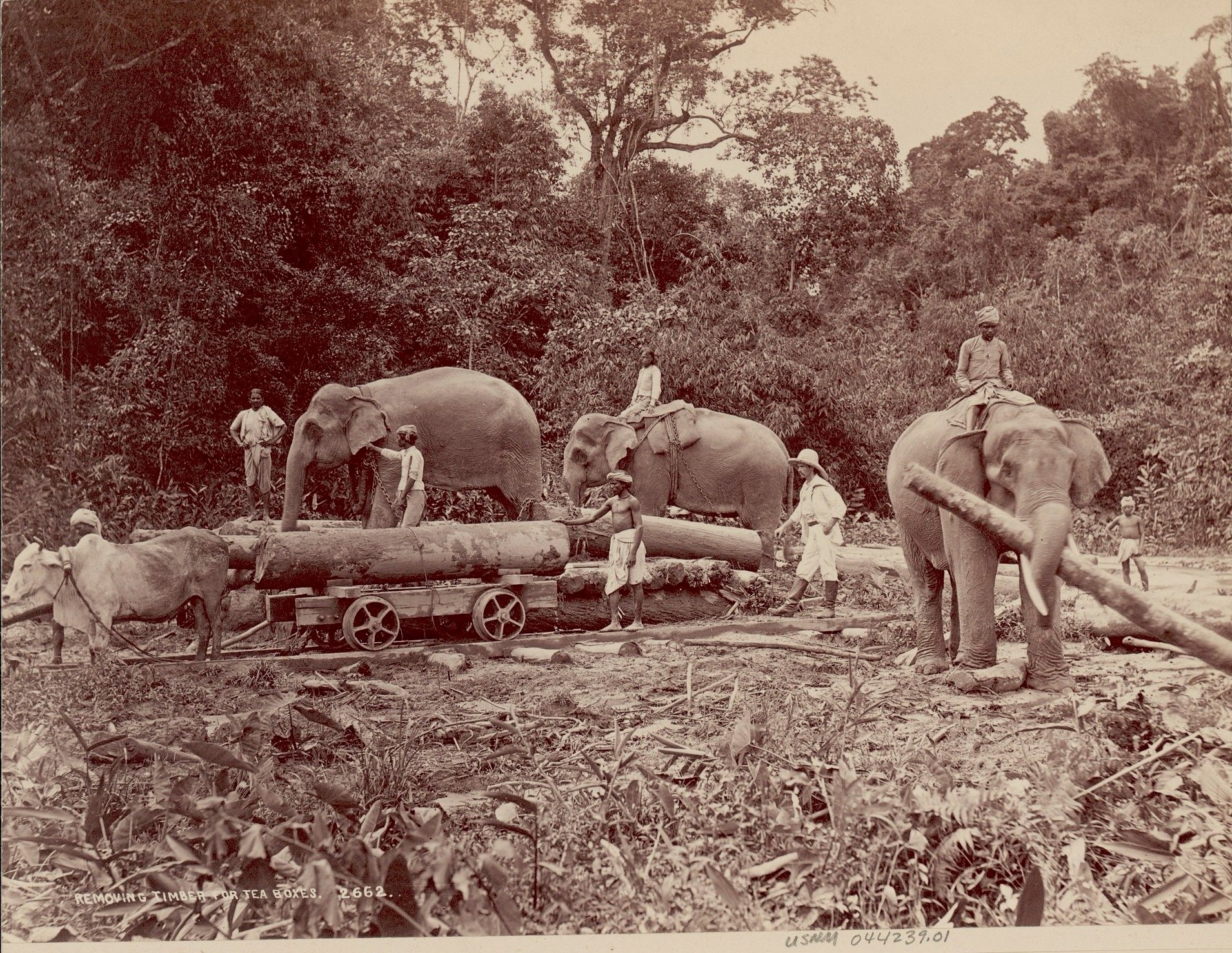
upcoming events
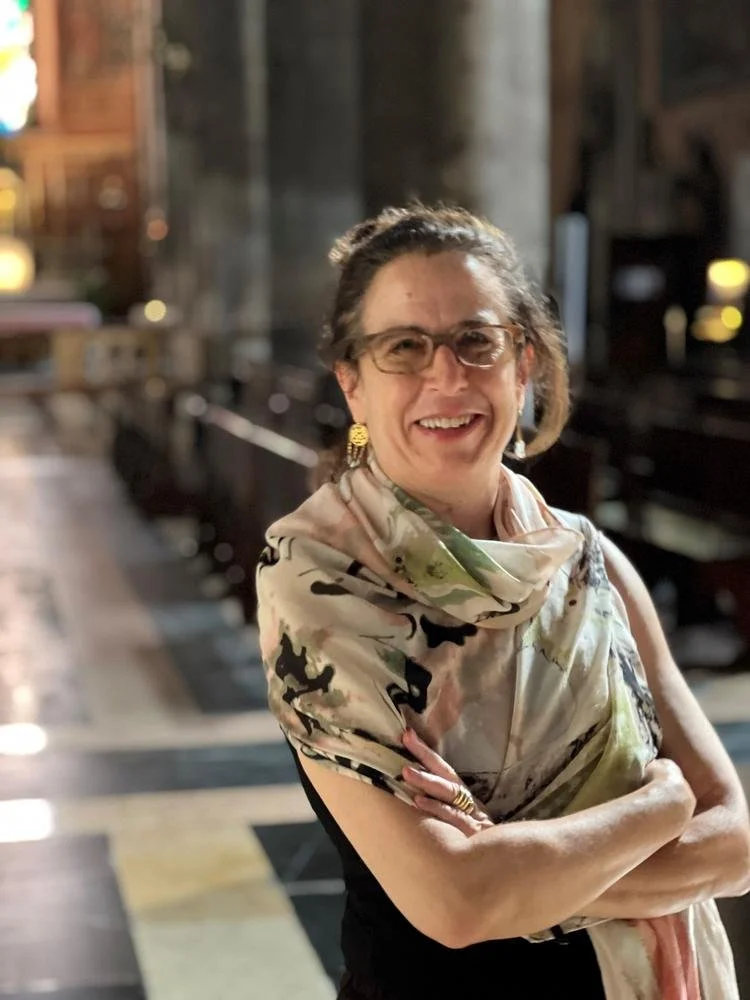
Julia Elyachar, On the Semicivilized: Coloniality, Finance, and Embodied Sovereignty in Cairo (2025)
Join us for an in-depth conversation with Julia Elyachar about her book, On the Semicivilized: Coloniality, Finance, and Embodied Sovereignty in Cairo (2025).
On the Semicivilized by Julia Elyachar is a sweeping analysis of the coloniality that shaped—and blocked—sovereign futures for those dubbed barbarian and semicivilized in the former Ottoman Empire. Drawing on thirty years of ethnographic research in Cairo, family archives from Palestine and Egypt, and research on Ottoman debt and finance to rethink catastrophe and potentiality in Cairo and the world today, Elyachar theorizes a global condition of the “semicivilized” marked by nonsovereign futures, crippling debts, and the constant specter of violence exercised by those who call themselves civilized. Originally used to describe the Ottoman Empire, whose perceived “civilizational differences” rendered it incompatible with a Western-dominated global order, semicivilized came to denote lands where unitary territorial sovereignty was stymied at the end of WWI. Elyachar’s theorizing offers a new analytic vocabulary for thinking beyond territoriality, postcolonialism, and the “civilized"/"primitive” divide. Looking at the world from the perspective of the semicivilized, Elyachar argues, allows us to shift attention to embodied infrastructures, collective lives, and practices of moving and acting in common that bypass lingering assumptions of territorialism and unitary sovereign rule.
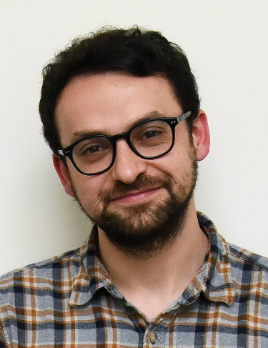
Mattin Biglari, Nationalising Oil and Knowledge in Iran: Labour, Decolonisation and Colonial Modernity, 1933–51 (2025)
Join us for an in-depth conversation with Mattin Biglari about his book, Nationalising Oil and Knowledge in Iran: Labour, Decolonisation and Colonial Modernity, 1933–51 (2025).
Iran’s nationalisation of oil in 1951 was a key catalyst for the rise of resource nationalism as an animating force of global decolonisation, expelling the Anglo-Iranian Oil Company (AIOC, now known as BP) after nearly fifty years of domination in southwest Iran. Nationalising Oil & Knowledge in Iran turns attention to the origins of nationalisation in the everyday struggles between the oil company and subaltern actors in the city of Abadan, then home to the world’s largest oil refinery and deeply imbricated in networks of colonialism and racial capitalism.
Engaging with energy history, postcolonial/subaltern studies, and science & technology studies, the book focuses on the politics of expertise: how nationalisation reproduced the epistemic coloniality of the oil company, which rested on local dispossession, social engineering, as well as racial and gendered segregation. It argues that nationalisation diverged from subaltern contestations of oil expertise in Abadan, which presented a more fundamental challenge to colonial modernity.
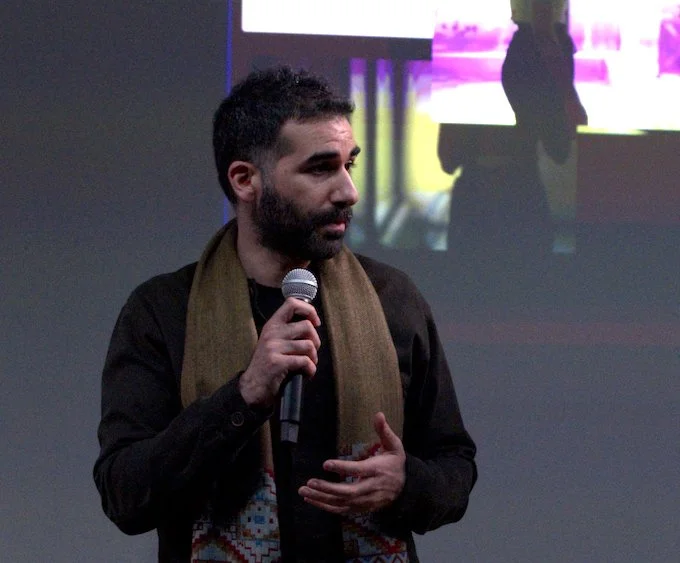
Nasser Abourahme, The Time beneath the Concrete: Palestine between Camp and Colony (2025)
Join us for an in-depth conversation with Nasser Abourahme about his book, The Time beneath the Concrete: Palestine between Camp and Colony (2025).
In The Time beneath the Concrete, Nasser Abourahme argues that settler colonialism is always as much an attempt to conquer time as it is to conquer land. Taking as his primary object Palestinian refugee camps, created in the fallout of the eliminatory violence of Israel’s founding, Abourahme shows how these camps become the primary place where settler colonial attempts to dominate space and time encounter Indigenous refusal. Seen from the camps, Israel becomes a settler colonial project defined by its inability to move past the past—a project stuck at its foundational moment of conquest. At the same time, the Palestinian insistence on return is a refusal to abide by the closure of the past into settler futurity. Palestinian struggle does not just happen in the open time of dispossession; it happens over this time. That struggle, Abourahme demonstrates, is a form of anticolonial refusal that draws its power not from any decisive finality, but precisely from irresolution and keeping time open.

Sharad Chari, Apartheid Remains (2024)
Join us for an in-depth conversation with Sharad Chari about his book, Apartheid Remains (2024). We are also thrilled to be joined by Sarah El-Kazaz as a respondent to the book.
In Apartheid Remains, Sharad Chari explores how people handle the remains of segregation and apartheid in South Africa as witnessed through portals in an industrial-residential landscape in the Indian Ocean city of Durban. Through long-term historical and ethnographic research, Chari portrays South Africa’s twentieth century as a palimpsest that conserves the remains of multiple pasts, including attempts by the racial state to remake territory and personhood while instead deepening spatial contradictions and struggles. When South Durban’s denizens collectively mobilized in various ways---through Black Consciousness politics and other attempts at refusing the ruinous articulation of biopolitics, sovereignty, and capital---submerged traditions of the Indian Ocean and the Black Atlantic offered them powerful resources. Of these, Chari reads Black documentary photography as particularly insightful audiovisual blues critique. At the tense interface of Marxism, feminism, and Black study, he offers a method and form of geography attentive to the spatial and embodied remains of history. Apartheid Remains looks out from South Durban to imaginations of abolition of all forms of racial capitalism and environmental suffering that define our planetary predicament.
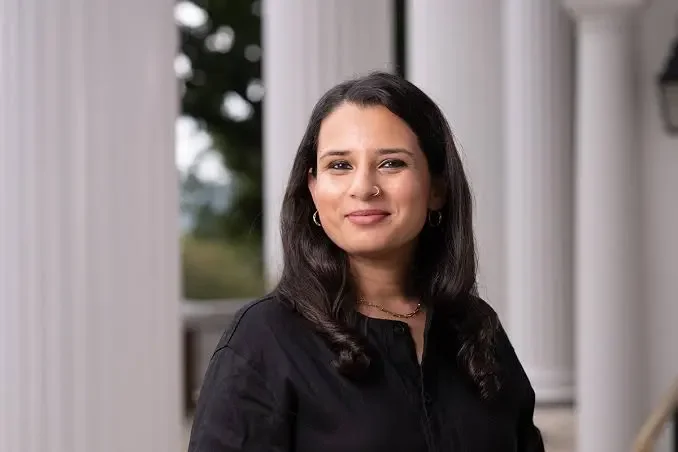
Hafsa Kanjwal, Colonizing Kashmir: State-building under Indian Occupation
Join us for an in-depth conversation with Hafsa Kanjwal about her book, Colonizing Kashmir: State-building under Indian Occupation (2022). We are also thrilled to be joined by Samia Khatun and Tanvi Kanchan as respondents to the book.
The Indian government, touted as the world's largest democracy, often repeats that Jammu and Kashmir—its only Muslim-majority state—is "an integral part of India." The region, which is disputed between India and Pakistan, and is considered the world's most militarized zone, has been occupied by India for over seventy-five years. In this book, Hafsa Kanjwal interrogates how Kashmir was made "integral" to India through a study of the decade long rule (1953-1963) of Bakshi Ghulam Mohammad, the second Prime Minister of the State of Jammu and Kashmir. Drawing upon a wide array of bureaucratic documents, propaganda materials, memoirs, literary sources, and oral interviews in English, Urdu, and Kashmiri, Kanjwal examines the intentions, tensions, and unintended consequences of Bakshi's state-building policies in the context of India's colonial occupation. She reveals how the Kashmir government tailored its policies to integrate Kashmir's Muslims while also showing how these policies were marked by inter-religious tension, corruption, and political repression.
Challenging the binaries of colonial and postcolonial, Kanjwal historicizes India's occupation of Kashmir through processes of emotional integration, development, normalization, and empowerment to highlight the new hierarchies of power and domination that emerged in the aftermath of decolonization. In doing so, she urges us to question triumphalist narratives of India's state-formation, as well as the sovereignty claims of the modern nation-state.

Françoise Vergès, Making the World Clean: Wasted Lives, Wasted Environment, and Racial Capitalism
Join us for an in-depth conversation with Françoise Vergès about her book, Making the World Clean: Wasted Lives, Wasted Environment, and Racial Capitalism (2024). We are also thrilled to be joined by Helen Malhotra and Lisa Tilley as respondents to the book.
In Making the World Clean: Wasted Lives, Wasted Environment, and Racial Capitalism, Françoise Vergès examines the racial and gendered politics of wasting lands, bodies, and resources and the organized deprivation of clean water, shelter, and access to health services—in other words, the structural denial, along racial lines, of vital needs. Through 38 short sections, she looks at the social relations that have made cleaning into drudgery and into a racialized, gendered, poorly paid job that is nevertheless necessary for any society to function. She concludes with the proposition of a feminist, decolonial, antiracist, anti-patriarchal, and anti-capitalist politics of cleaning. Or, simply put, of “decolonial cleaning.”
To Vergès, the structural denial of the elemental needs of women of color (sanitary pads, access to water, and privacy for basic washing), and why these needs are considered insignificant and trivial, shows how racism and class war are gendered. By examining the banal, the trivial, and the elemental, the author addresses cleaning as a necessity rather than the maintenance of a consumerist lifestyle, a condition of basic care of the body and the mind that is considered with indifference by racial capitalism, white environmentalism, and even, too often, by humanitarian organizations. She argues that by building “life-affirming institutions,” as Ruth Wilson Gilmore advocates, struggles against the whitening of cleaning create sites of freedom. “Decolonial cleaning” imagines cleaning as taking care of land, humans, plants, animals, and rivers, not seeking to discipline them or transform them into commodities or objects of conservation but cleaning as a practice dedicated to sustaining the living world.
Book excerpts
We kindly request attendees to read the sections "Is Cleaning a Decolonial Struggle", "The Elemental", "The Denial of Vital Needs", "Colonialism Lays Waste" and "Antiracist Politics of Breathing" from the book before attending the seminar, so that we can facilitate a lively and thoughtful discussion. The ebook can be found at this link: https://soas.on.worldcat.org/oclc/1485004434

Tithi Bhattacharya, Ghostly Past, Capitalist Presence: A Social History of Fear in Colonial Bengal
Join us for an in-depth conversation with Tithi Bhattacharya about her book, Ghostly Past, Capitalist Presence: A Social History of Fear in Colonial Bengal (2024). We are also thrilled to be joined by Tania Bhattacharyya as a respondent to the book.
In Ghostly Past, Capitalist Presence, Tithi Bhattacharya maps the role that Bengali ghosts and ghost stories played in constituting the modern Indian nation, and the religious ideas seeded therein, as it emerged in dialogue with European science. Bhattacharya introduces readers to the multifarious habits and personalities of Bengal’s traditional ghosts and investigates and mourns their eventual extermination. For Bhattacharya, British colonization marked a transition from the older, multifaith folk world of traditional ghosts to newer and more frightening specters. These "modern" Bengali ghosts, borne out of a new rationality, were homogeneous specters amenable to "scientific" speculation and invoked at séance sessions in elite drawing rooms. Reading literature alongside the colonial archive, Bhattacharya uncovers a new reordering of science and faith from the middle of the nineteenth century. She argues that these shifts cemented the authority of a rising upper-caste colonial elite who expelled the older ghosts in order to recast Hinduism as the conscience of the Indian nation. In so doing, Bhattacharya reveals how capitalism necessarily reshaped Bengal as part of the global colonial project.

Nicky Falkof, Worrier State: risk, anxiety and moral panic in south Africa
Join us for an in-depth conversation with Nicky Falkof about her book, Worrier State: Risk, Anxiety and Moral Panic in South Africa (2022). We are also thrilled to be joined by Sharri Plonski as a respondent to the book.
Risk, anxiety and moral panic are endemic to contemporary societies and media forms. How do these phenomena manifest in a place like South Africa, which features heightened insecurity, deep inequality and accelerated social change? What happens when cultures of fear intersect with pervasive systems of gender, race and class?
Worrier state investigates four case studies in which fear and anxiety appear in radically different ways: the far right myth of 'white genocide'; so-called 'Satanist' murders of young women; an urban legend about township crime; and social theories about safety and goodness in the suburbs. Falkof foregrounds the significance of emotion as a socio-political force, emphasising South Africa's imbrication within globalised conditions of anxiety and thus its fundamental and often-ignored hypermodernity. The book offers a bold and creative perspective on the social roles of fear and emotion in South Africa and thus on everyday life in this complex place.

Omar Cheta, How Commerce Became Legal: Merchants and Market Governance in Nineteenth-Century Egypt
Join us for the UK book launch of Omar Cheta’s much anticipated, How Commerce Became Legal: Merchants and Market Governance in Nineteenth-Century Egypt (2025). We are also thrilled to be joined by Yosra Hussein and Hengameh Ziai as respondents to the book.
Book Description:
When Egypt's markets opened to private capital in the 1840s, a new infrastructure of commercial laws and institutions emerged. Egypt became the site of profound legal experimentation, and the resulting commercial sphere reflected the political contestations among the governors of Egypt, European consulates, Ottoman rulers, and a growing number of private entrepreneurs, both foreign and local. How Commerce Became Legal explores the legal and business practices that resulted from this fusion of Ottoman, French, and Islamic legal concepts and governed commerce in Egypt.
Focusing on the decades between the formalization of Cairo's practical autonomy within the Ottoman Empire in the 1840s and its incorporation into the British Empire in the 1880s, Omar Cheta considers how modern laws redefined the commercial sphere, shaping a mode of market governance that would persist for decades to come. He highlights the demarcation of a new law-defined commercial realm separate from the land regime and from civil or family-centered exchanges, and reconstructs these changes through both legal codes and state orders, as well as individual merchant voices preserved in court documents. As this book documents both individual experiences and structural explanations, it offers a rare perspective on the scope and reach of market governance over the mid nineteenth century, revealing changes simultaneously from within and without state institutions.

Catherine Hall, Lucky Valley: Edward Long and the History of Racial Capitalism
Join us for a deep conversation with Catherine Hall about her newest book, Lucky Valley: Edward Long and the History of Racial Capitalism (2024). We are also thrilled to be joined by Annabelle Gilmore and Samia Khatun as respondents to the book.
Book description:
Why does Edward Long's History of Jamaica matter? Written in 1774, Long's History, that most 'civilised' of documents, attempted to define White and Black as essentially different and unequal. Long deployed natural history and social theory, carefully mapping the island, and drawing on poetry and engravings, in his efforts to establish a clear and fixed racialized hierarchy. His White family sat at the heart of Jamaican planter society and the West India trade in sugar, which provided the economic bedrock of this eighteenth-century system of racial capitalism. Catherine Hall tells the story behind the History of a slave-owning family that prospered across generations together with the destruction of such possibilities for enslaved people. She unpicks the many contradictions in Long's thinking, exposing the insidious myths and stereotypes that have poisoned social relations over generations and allowed reconfigured forms of racial difference and racial capitalism to live on in contemporary societies.
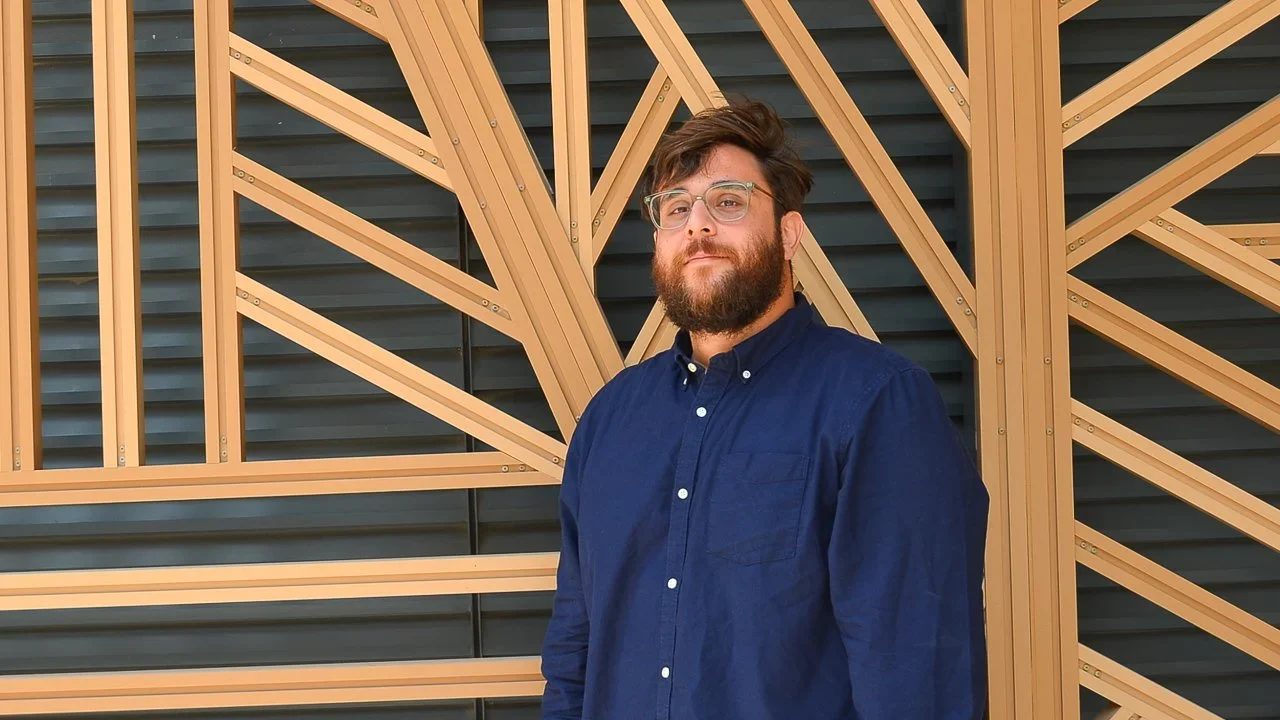
Esmat El Halaby, Parting Gifts of Empire: Palestine and India at the Dawn of Decolonization
Join us for a discussion of the much anticipated, Parting Gifts of Empire: Palestine and India at the Dawn of Decolonization, with Esmat El Halaby! We are also thrilled to be joined by Mai Taha (LSE) and Nivi Manchanda (Queen Mary) as respondents to the book.
Parting Gifts of Empire narrates an untold story of how Arabs and South Asians in the twentieth century sought to decolonize their minds. The histories of Palestine and India—both partitioned by the British Empire—are intimately linked. In the face of similar imperially created chasms, Arab and Indian intellectuals reinvigorated centuries of shared histories to forge new horizons, new solidarities, new institutions, and new fields of knowledge. In this book, Esmat Elhalaby traces the forgotten lives of scholars like Wadi’ al-Bustani, revisits Arab and Indian feminist meetings, highlights gatherings such as Delhi’s 1947 Asian Relations Conference, and argues for the centrality of Palestine to the rise of the Third World. This book breaks new ground to unfold a global intellectual history of anticolonialism, Asian unity, pan-Islamism, and nonalignment in the making of what became known as the Global South.

In Conversation: Adam Hanieh on 'Crude Capitalism' and Arang Keshavarzian on 'Making Space for the Gulf'
Join us as we discuss two recently published and long awaited books that bring fresh insight into histories of capitalism, infrastructure and oil in the Middle East, especially the Gulf’s place in global accumulation: Adam Hanieh’s Crude Capitalism: Oil, Corporate Power, and the Making of the the World Market (Verso, 2024) and Arang Keshavarzian’s Making Space for the Gulf: Histories of Regionalism and the Middle East (Stanford University Press, 2024.
This will be an in-person event with the two authors, who will speak about their books in conversation with one another and with all in attendance. Registration is required for attendance - please register here.
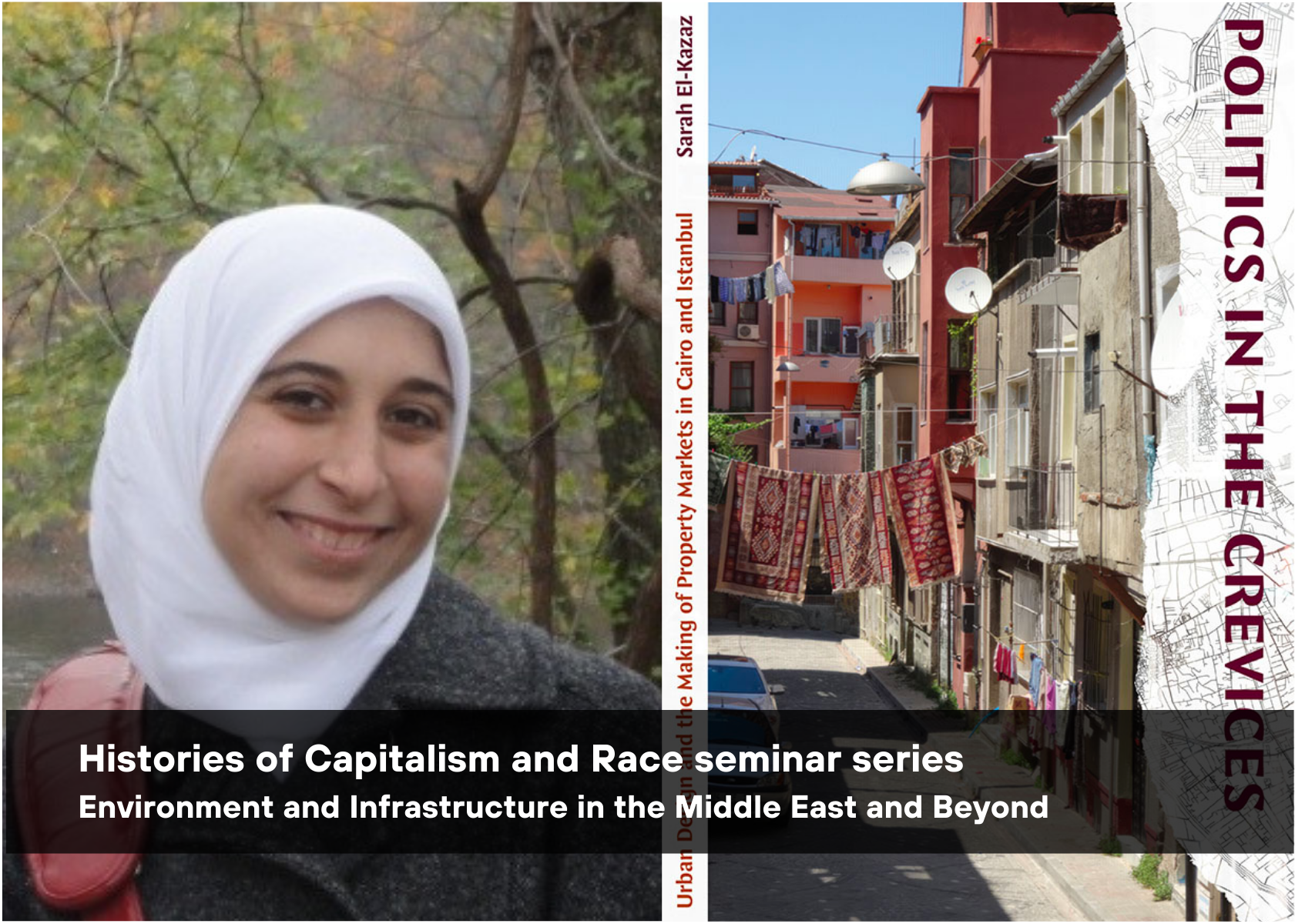
Sarah El-Kazaz, Politics in the Crevices: Urban Design and the Making of Property Markets in Cairo and Istanbul (2023)
Histories of Capitalism and Race: Environment and Infrastructure in the Middle East and Beyond seminar series
Dr Sarah El-Kazaz (SOAS) will be speaking about Politics in the Crevices: Urban Design and the Making of Property Markets in Cairo and Istanbul (Duke University Press, 2023), followed by a group discussion of the book.
Registration is required and attendees are encouraged to read the pre-circulated extracts in advance. Extracts will be sent by email to addresses provided during registration.
Book blurb:
In Politics in the Crevices, Sarah El-Kazaz takes readers into the world of urban planning and design practices in Istanbul and Cairo. In this transnational ethnography of neighborhoods undergoing contested rapid transformations, she reveals how the battle for housing has shifted away from traditional political arenas onto private crevices of the city. She outlines how multiple actors—from highly capitalized international NGOs and corporations to city dwellers, bureaucrats, and planning experts—use careful urban design to empower conflicting agendas, whether manipulating property markets to protect affordable housing or corner luxury real estate. El-Kazaz shows that such contemporary politicizations of urban design stem from unresolved struggles at the heart of messy transitions from the welfare state to neoliberalism, which have shifted the politics of redistribution from contested political arenas to design practices operating within market logics, ultimately relocating political struggles onto the city’s most intimate crevices. In so doing, she raises critical questions about the role of market reforms in redistributing resources and challenges readers to rethink neoliberalism and the fundamental ways it shapes cities and polities.
Registration is required.
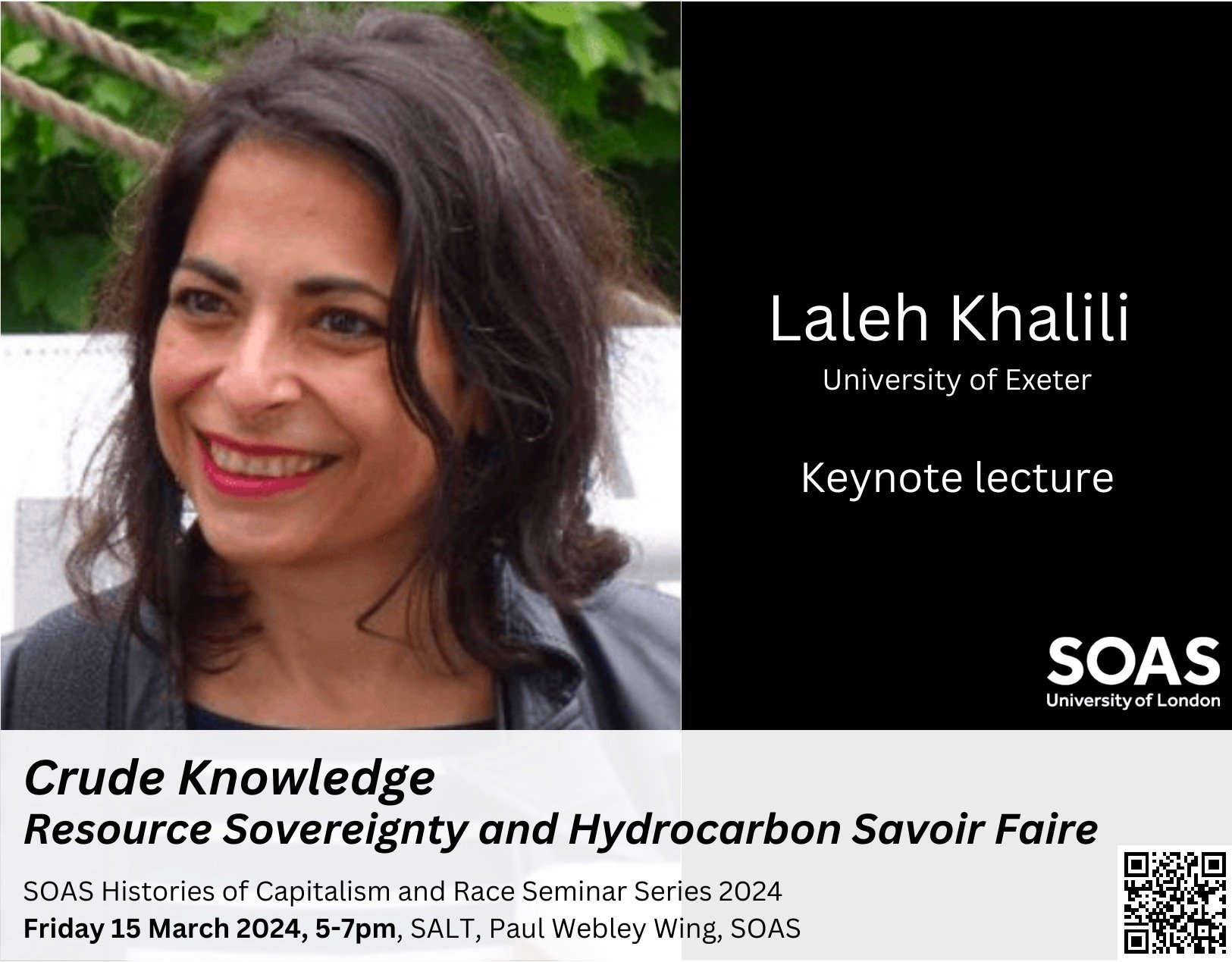
Laleh Khalili, Crude knowledge: Resource sovereignty and hydrocarbon savoir faire
Histories of Capitalism and Race: Environment and Infrastructure in the Middle East and Beyond seminar series
Prof. Laleh Khalili (University of Exeter) will give a keynote lecture entitled Crude Knowledge: Resource Sovereignty and Hydrocarbon Savoir Faire.
Registration is required.
Abstract:
The period of struggle over hydrocarbon sovereignty in the Arab world – the 1950s-1970s – saw a spate of periodicals in Arabic about oil. These included periodicals produced by the public relations departments of Euro-American oil companies, as well as monthlies, weeklies and quarterlies produced by Arab journalists, experts, and former oil revolutionaries in Cairo, Baghdad, Beirut and Kuwait. This lecture argues that the trajectory of these latter publications – both their context and content – traces the massive political transformations that saw a shift of power in the region, alongside a radical transformation in the representation of oil from a public good into a private property.

Laleh Khalili, Sinews of War and Trade: Shipping and Capitalism in the Arabian Peninsula (2020)
Histories of Capitalism and Race: Environment and Infrastructure in the Middle East and Beyond seminar series
Prof. Laleh Khalili (University of Exeter) will be speaking about Sinews of War and Trade: Shipping and Capitalism in the Arabian Peninsula (Verso, 2020), followed by a group discussion of the book.
Registration is required and attendees are encouraged to read the pre-circulated extracts in advance. Extracts will be sent by email to addresses provided during registration.
Book blurb:
On the map of global trade, China is now the factory of the world. A parade of ships full of raw commodities—iron ore, coal, oil—arrive in its ports, and fleets of container ships leave with manufactured goods in all directions. The oil that fuels China’s manufacturing comes primarily from the Arabian peninsula. Much of the material shipped from China are transported through the ports of Arabian peninsula, Dubai’s Jabal Ali port foremost among them. China’s ‘maritime silk road’ flanks the peninsula on all sides.
Sinews of War and Trade is the story of what the making of new ports and shipping infrastructure has meant not only for the Arabian peninsula itself, but for the region and the world beyond. The book is an account of how maritime transportation is not simply an enabling companion of trade, but central to the very fabric of global capitalism. The ports that serve maritime trade, logistics, and hydrocarbon transport create racialised hierarchies of labour, engineer the lived environment, aid the accumulation of capital regionally and globally, and carry forward colonial regimes of profit, law and administration.
Registration is required.

Hannah Appel, The Licit Life of Capitalism: US Oil in Equatorial Guinea (2019)
Histories of Capitalism and Race: Environment and Infrastructure in the Middle East and Beyond seminar series
Prof. Hannah Appel (UCLA) will be speaking about The Licit Life of Capitalism: US Oil in Equatorial Guinea (Duke University Press, 2019), followed by a group discussion of the book.
Registration is required and attendees are encouraged to read the pre-circulated extracts in advance. Extracts will be sent by email to addresses provided during registration.
Book blurb:
The Licit Life of Capitalism is both an account of a specific capitalist project—U.S. oil companies working off the shores of Equatorial Guinea—and a sweeping theorization of more general forms and processes that facilitate diverse capitalist projects around the world. Hannah Appel draws on extensive fieldwork with managers and rig workers, lawyers and bureaucrats, the expat wives of American oil executives and the Equatoguinean women who work in their homes, to turn conventional critiques of capitalism on their head, arguing that market practices do not merely exacerbate inequality; they are made by it. People and places differentially valued by gender, race, and colonial histories are the terrain on which the rules of capitalist economy are built. Appel shows how the corporate form and the contract, offshore rigs and economic theory are the assemblages of liberalism and race, expertise and gender, technology and domesticity that enable the licit life of capitalism—practices that are legally sanctioned, widely replicated, and ordinary, at the same time as they are messy, contested, and, arguably, indefensible.
Registration is required.

Munira Khayyat, A Landscape of War: Ecologies of Resistance and Survival in South Lebanon (2022)
Histories of Capitalism and Race: Environment and Infrastructure in the Middle East and Beyond seminar series
Dr Munira Khayyat (NYU Abu Dhabi) will be speaking about A Landscape of War: Ecologies of Resistance and Survival in South Lebanon (University of California Press, 2022), followed by a group discussion of the book.
Registration is required and attendees are encouraged to read the pre-circulated extracts in advance. Extracts will be sent by email to addresses provided during registration.
Book blurb:
What worlds take root in war? In this book, anthropologist Munira Khayyat describes life along the southern border of Lebanon, where resistant ecologies thrive amid a terrain of perennial war. A Landscape of War takes us to frontline villages where armed invasions, indiscriminate bombings, and scattered land mines have become the environment where everyday life is waged. This book dwells with multispecies partnerships such as tobacco farming and goatherding that carry life through seasons of destruction. Neither green-tinged utopia nor total devastation, these ecologies make life possible in an insistently deadly region. Sourcing an anthropology of war from where it is lived, this book decolonizes distant theories of war and brings to light creative practices forged in the midst of ongoing devastation. In lyrical prose that resonates with imperiled conditions across the Global South, Khayyat paints a portrait of war as a place where life must go on.
Registration is required.

Jessica Barnes, Staple Security: Bread and Wheat in Egypt (2022)
Histories of Capitalism and Race: Environment and Infrastructure in the Middle East and Beyond seminar series
Dr Jessica Barnes (University of South Carolina) will be speaking about Staple Security: Bread and Wheat in Egypt (Duke University Press, 2022), followed by a group discussion of the book.
Registration is required and attendees are encouraged to read the pre-circulated extracts in advance. Extracts will be sent by email to addresses provided during registration.
Book blurb:
Egyptians often say that bread is life; most eat this staple multiple times a day, many relying on the cheap bread subsidized by the government. In Staple Security, Jessica Barnes explores the process of sourcing domestic and foreign wheat for the production of bread and its consumption across urban and rural settings. She traces the anxiety that pervades Egyptian society surrounding the possibility that the nation could run out of wheat or that people might not have enough good bread to eat, and the daily efforts to ensure that this does not happen. With rich ethnographic detail, she takes us into the worlds of cultivating wheat, trading grain, and baking, buying, and eating bread. Linking global flows of grain and a national bread subsidy program with everyday household practices, Barnes theorizes the nexus between food and security, drawing attention to staples and the lengths to which people go to secure their consistent availability and quality.
Registration is required.

Caterina Scaramelli, How to Make a Wetland: Water and Moral Ecology in Turkey (2021)
Histories of Capitalism and Race: Environment and Infrastructure in the Middle East and Beyond seminar series
Dr Caterina Scaramelli (Boston University) will be speaking about How to Make a Wetland: Water and Moral Ecology in Turkey (Stanford University Press, 2021), followed by a group discussion of the book.
Registration is required and attendees are encouraged to read the pre-circulated extracts in advance. Extracts will be sent by email to addresses provided during registration.
Book blurb:
How to Make A Wetland tells the story of two Turkish coastal areas, both shaped by ecological change and political uncertainty. On the Black Sea coast and the shores of the Aegean, farmers, scientists, fishermen, and families grapple with livelihoods in transition, as their environment is bound up in national and international conservation projects. Bridges and drainage canals, apartment buildings and highways—as well as the birds, water buffalo, and various animals of the regions—all inform a moral ecology in the making.
Drawing on six years of fieldwork in wetlands and deltas, Caterina Scaramelli offers an anthropological understanding of sweeping environmental and infrastructural change, and the moral claims made on livability and materiality in Turkey, and beyond. Beginning from a moral ecological position, she takes into account the notion that politics is not simply projected onto animals, plants, soil, water, sediments, rocks, and other non-human beings and materials. Rather, people make politics through them. With this book, she highlights the aspirations, moral relations, and care practices in constant play in contestations and alliances over environmental change.
Registration is required.
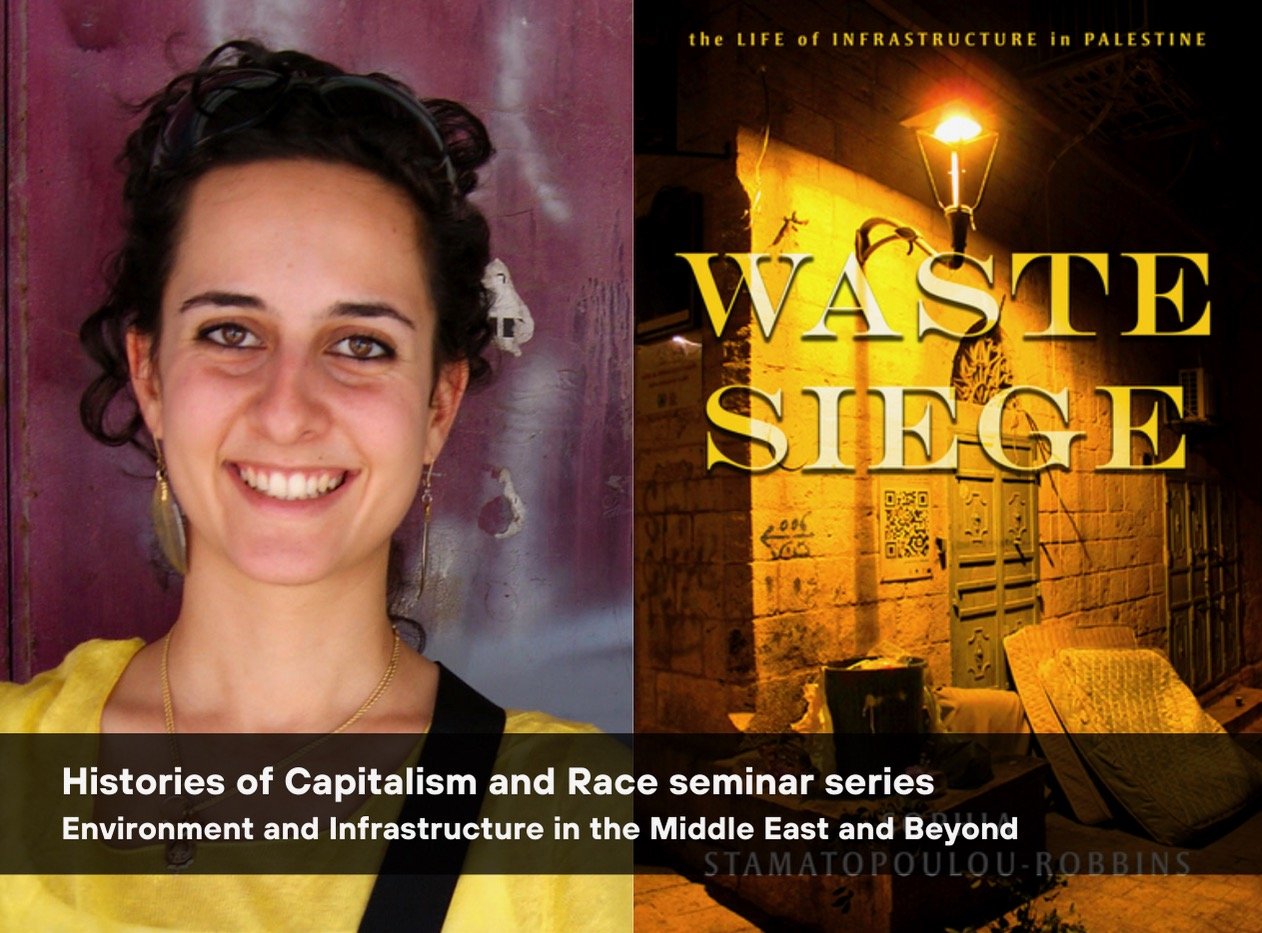
Sophia Stamatopoulou-Robbins, Waste Siege: The Life of infrastructure in Palestine (2019)
Histories of Capitalism and Race: Environment and Infrastructure in the Middle East and Beyond seminar series
Dr Sophia Stamatopoulou-Robbins (Bard College) will be speaking about Waste Siege: The Life of Infrastructure in Palestine (Stanford University Press, 2019), followed by a group discussion of the book.
Registration is required and attendees are encouraged to read the pre-circulated extracts (introduction and chapters 2 and 3) in advance. Extracts will be sent by email to addresses provided during registration.
Book blurb:
Waste Siege offers an analysis unusual in the study of Palestine: it depicts the environmental, infrastructural, and aesthetic context in which Palestinians are obliged to forge their lives. To speak of waste siege is to describe a series of conditions, from smelling wastes to negotiating military infrastructures, from biopolitical forms of colonial rule to experiences of governmental abandonment, from obvious targets of resistance to confusion over responsibility for the burdensome objects of daily life. Within this rubble, debris, and infrastructural fallout, West Bank Palestinians create a life under settler colonial rule.
Sophia Stamatopoulou-Robbins focuses on waste as an experience of everyday life that is continuous with, but not a result only of, occupation. Tracing Palestinians' own experiences of wastes over the past decade, she considers how multiple authorities governing the West Bank—including municipalities, the Palestinian Authority, international aid organizations, NGOs, and Israel—rule by waste siege, whether intentionally or not. Her work challenges both common formulations of waste as "matter out of place" and as the ontological opposite of the environment, by suggesting instead that waste siege be understood as an ecology of "matter with no place to go." Waste siege thus not only describes a stateless Palestine, but also becomes a metaphor for our besieged planet.
Registration is required.
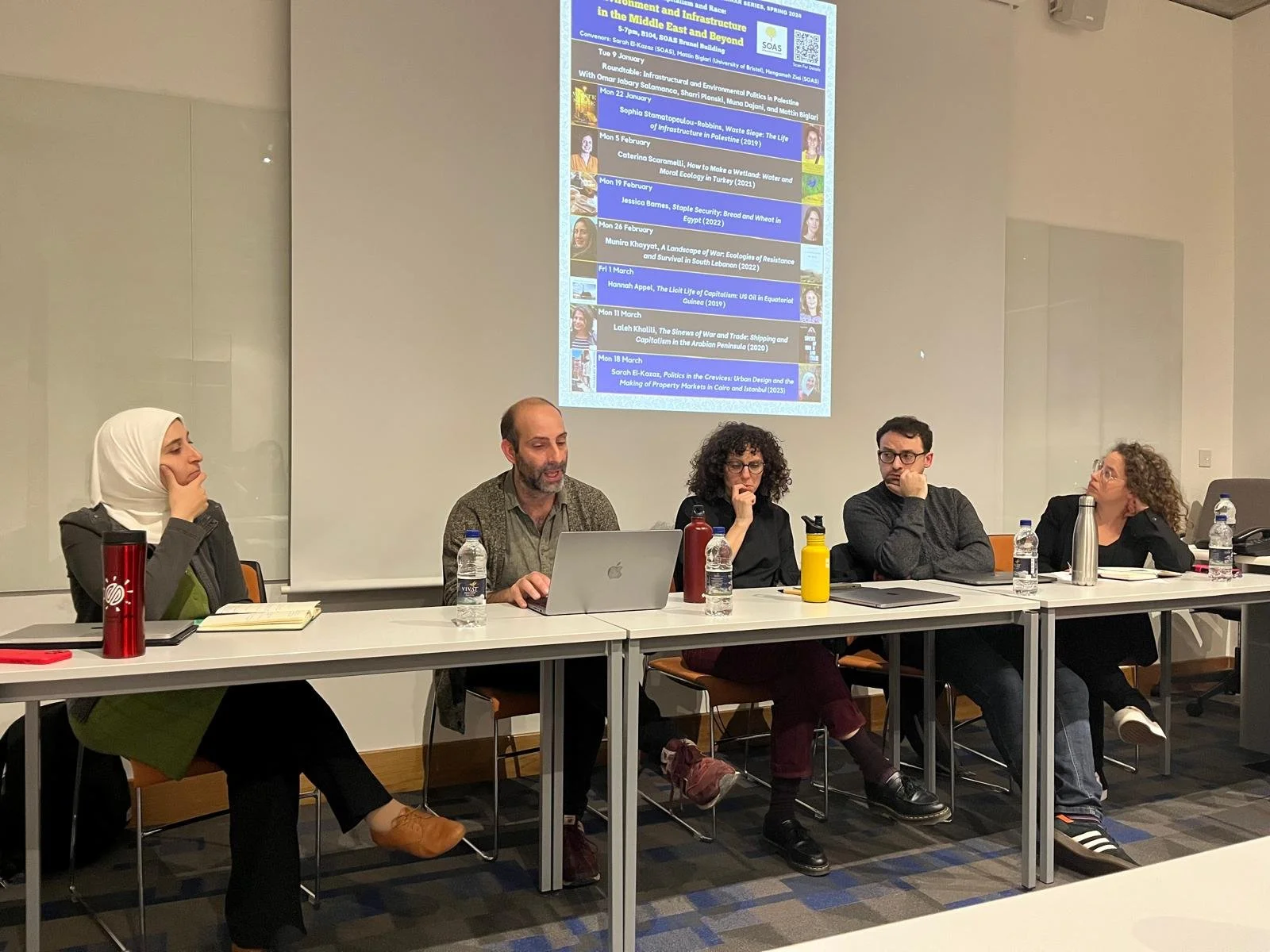
Roundtable: Infrastructural and Environmental Politics in Palestine
Join us for a roundtable discussion on ‘Infrastructural and Environmental Politics in Palestine’, featuring Omar Jabary Salamanca (University of Ghent), Sharri Plonski (Queen Mary, University of London), Muna Dajani (LSE), and Mattin Biglari (University of Bristol).
This roundtable discussion focuses on the contemporary and historical politics of infrastructure and environment in Palestine, particularly in relation to to Israel’s settler colonial project and the unfolding genocide in Gaza. The roundtable inaugurates a new seminar series organised by the SOAS Walter Rodney Collective on ‘Environment and Infrastructure in the Middle East and Beyond’, taking place at SOAS during spring term 2024.
The event is welcome to all but registration is required (more details to follow).

Dr Timothy Mitchell Speaking about his new book project
Histories of Capitalism and Race in the Middle East and Indian Ocean seminar series
Dr Timothy Mitchell will be speaking about his new book project, followed by a group discussion of the book. Registration is required and attendees are encouraged to read the pre-circulated extracts in advance.

Dr Andrew b. Liu (Villanova University), Tea War: A History of Capitalism in China and India (2020)
Histories of Capitalism and Race in the Middle East and Indian Ocean seminar series
Dr Andrew B. Liu will be speaking about Tea War: A History of Capitalism in China and India (Yale University Press, 2020), followed by a group discussion of the book. Registration is required and attendees are encouraged to read the pre-circulated extracts in advance.

Dr Katayoun Shafiee (University of Warwick), Machineries of Oil: An Infrastructural History of BP in Iran (2018)
Histories of Capitalism and Race in the Middle East and Indian Ocean seminar series
Dr Katayoun Shafiee will be speaking about Machineries of Oil: An Infrastructural History of BP in Iran (MIT Press, 2018), followed by a group discussion of the book. Registration is required and attendees are encouraged to read the pre-circulated extracts in advance.

Dr Johan Mathew (Rutgers University), Margins of the Market: Trafficking and Capitalism across the Arabian Sea (2016)
Histories of Capitalism and Race in the Middle East and Indian Ocean seminar series
Dr Johan Mathew will be speaking about Margins of the Market: Trafficking and Capitalism Across the Arabian Sea (University of California Press, 2016), followed by a group discussion of the book. Registration is required and attendees are encouraged to read the pre-circulated extracts in advance.

Dr Nurfadzilah Yahaya (Yale University), Fluid Jurisdictions: Colonial Law and Arabs in Southeast Asia (2020)
Histories of Capitalism and Race in the Middle East and Indian Ocean seminar series
Dr Nurfadzliah Yahaya will be speaking about Fluid Jurisdictions: Colonial Law and Arabs in Southeast Asia (Cornell University Press, 2020), followed by a group discussion of the book. Registration is required and attendees are encouraged to read the pre-circulated extracts in advance.

Dr Aaron Jakes (University of Chicago), Egypt’s Occupation: Colonial Economism and the Crises of Capitalism (2020)
Histories of Capitalism and Race in the Middle East and Indian Ocean seminar series
Dr Aaron Jakes will be speaking about Egypt’s Occupation: Colonial Economism and the Crises of Capitalism (Stanford University Press, 2020), followed by a group discussion of the book. Registration is required and attendees are encouraged to read the pre-circulated extracts in advance.

Dr Muriam Haleh Davis (UC Santa Cruz), Markets of Civilization: Islam and Racial Capitalism in Algeria (2022)
Histories of Capitalism and Race in the Middle East and Indian Ocean seminar series
Dr Muriam Haleh Davis will be speaking about Markets of Civilization: Islam and Racial Capitalism in Algeria (Duke University Press, 2022), followed by a group discussion of the book. Registration is required and attendees are encouraged to read the pre-circulated extracts in advance.

Dr Alden Young (UCLA), Transforming Sudan: Decolonization, Economic Development, and State Formation (2017)
Histories of Capitalism and Race in the Middle East and Indian Ocean seminar series
Dr Alden Young will be speaking about Transforming Sudan: Decolonization, Development, and State Formation (Cambridge University Press, 2017), followed by a group discussion of the book. Registration is required and attendees are encouraged to read the pre-circulated extracts in advance.

Dr Nada Moumtaz (University of Toronto), God’s Property: Islam, Charity and the Modern State (2021)
Histories of Capitalism and Race in the Middle East and Indian Ocean seminar series
Dr Nada Moumtaz will speak about God's Property: Islam, Charity and the Modern State (University of California Press, 2021), followed by a group discussion of the book. Registration is required and attendees are encouraged to read the pre-circulated extracts in advance.

How Europe Underdeveloped Africa: 50 Years On
Join us for the inaugural event of the SOAS Walter Rodney Collective, a new research cluster named in honour of the influential SOAS alumnus and pan-African, Marxist scholar-activist. The collective is hosted by the School of History, Religions and Philosophies at SOAS, University of London.
Marking the 50th anniversary of Walter Rodney’s How Europe Underdeveloped Africa (1972), this event will feature scholars of racial capitalism, Dr Madalitso Zililo Phiri (University of Johannesburg) and Rafeef Ziadah (KCL) as part of a roundtable discussion with SOAS faculty and students. What is this book’s legacy and the lessons it continues to offer for historical research today? What is the significance of this text for thinking through SOAS’s own colonial legacy–and its radical potential?

Histories of capitalism & race Workshop
Hosted by the School of History, Religions, and Philosophies at SOAS, this workshop aims to generate discussion about what it means to think about histories of capitalism and race beyond Eurocentric conceptual frameworks – and how starting from the histories of Asia and Africa offers alternative theoretical starting points.


